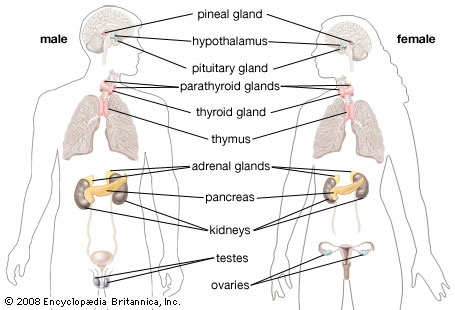parathyroid gland
anatomy
 endocrine (endocrine system, human) glands occurring in all vertebrate species from amphibia upward, usually located close to and behind the thyroid gland. The parathyroid glands secrete parathyroid hormone, which functions to maintain normal serum calcium and phosphate concentrations. Humans usually have four parathyroid glands, each composed of closely packed epithelial (epithelium) cells separated by thin fibrous bands and some fat cells.
endocrine (endocrine system, human) glands occurring in all vertebrate species from amphibia upward, usually located close to and behind the thyroid gland. The parathyroid glands secrete parathyroid hormone, which functions to maintain normal serum calcium and phosphate concentrations. Humans usually have four parathyroid glands, each composed of closely packed epithelial (epithelium) cells separated by thin fibrous bands and some fat cells.Parathyroid hormone is secreted when serum calcium concentrations fall—for example, in patients with vitamin D deficiency (vitamin D is necessary for absorption of calcium from the gastrointestinal tract) or kidney failure. A slight fall in serum calcium will trigger parathyroid hormone secretion. The increase in parathyroid hormone secretion raises serum calcium by stimulating retention of calcium by the kidneys, mobilization of calcium from bone, and absorption of calcium by the gastrointestinal tract. Conversely, parathyroid hormone secretion is inhibited when serum calcium concentrations are high—for example, in vitamin D poisoning or diseases that increase breakdown of bone (notably different cancers).
Low serum calcium concentrations (hypocalcemia (calcium deficiency)) result in increased excitability of nerves and muscles ( tetany), which results in muscle spasms, numbness and tingling around the mouth and in the hands and feet, and, occasionally, convulsions. High serum calcium concentrations (hypercalcemia) result in loss of appetite, nausea, vomiting, constipation, muscle weakness, fatigue, mental dysfunction, and increased thirst and urination.
Parathyroid hormone also affects the metabolism of phosphate (phosphorus). An excess of the hormone causes an increase in phosphate excretion in the urine and low serum phosphate concentrations. Reduced parathyroid function results in a decrease in phosphate excretion in the urine and high serum phosphate concentrations.
Parathyroid hormone also plays a role in the regulation of magnesium metabolism by increasing its excretion. magnesium deficiency results in a decrease in parathyroid hormone secretion in some patients and decreased tissue action of parathyroid hormone in other patients.
Increased parathyroid hormone secretion ( hyperparathyroidism) may be primary or secondary. Primary hyperparathyroidism is usually caused by a benign tumour of one parathyroid gland and is characterized by high serum calcium and, occasionally, low serum phosphate concentrations. In addition to symptoms of hypercalcemia, patients with primary hyperparathyroidism may have kidney stones or low bone density. Secondary hyperparathyroidism refers to the compensatory increase in parathyroid hormone secretion that occurs when serum calcium concentrations fall—for example, as a result of vitamin D deficiency or kidney disease (renal system disease). This increase in parathyroid hormone secretion often restores serum calcium concentrations to normal, or nearly so, but in the process may cause loss of bone. In secondary hyperparathyroidism, all parathyroid glands are enlarged.
There are two types of parathyroid hormone deficiency ( hypoparathyroidism). One results from destruction or surgical removal of the parathyroid glands (usually inadvertent, at the time of thyroid surgery). The other is pseudohypoparathyroidism, in which there is kidney or bone resistance to the action of parathyroid hormone.
- Leonard Henry Courtney, Baron Courtney
- Leonard Henry Courtney Courtney, Baron
- Leonard Michaels
- Leonardo Bruni
- Leonardo da Vinci
- Leonardo da Vinci Museum of Science and Technology
- Leonardo DiCaprio
- Leonardo Leo
- Leonardo Pisano
- Leonardo Sciascia
- Leonardo Vinci
- Leonard, Sugar Ray
- Leonard Trelawny Hobhouse
- Leonard Warren
- Leonard Wood
- Leonard Woolf
- Leon Battista Alberti
- Leoncavallo, Ruggero
- Leon Edel
- Leone Leoni
- Leonel Fernández Reyna
- Leone Modena
- Leone, Sergio
- Leon Fleisher
- Leon Forrest